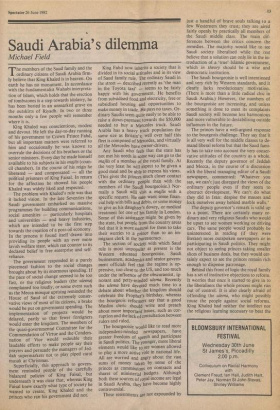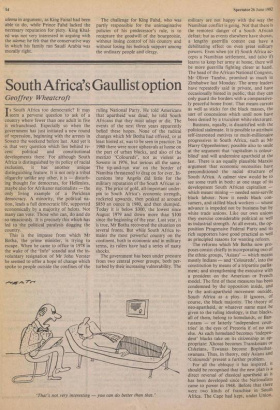Saudi Arabia's dilemma
Michael Field
The members of the Saud family and the ordinary citizens of Saudi Arabia firm- ly believe that King Khaled is in heaven. On earth he has no monument. In accordance with the fundamentalist Wahabi interpreta- tion of Islam, which holds that the erection of tombstones is a step towards idolatry, he has been buried in an unmarked grave on the outskirts of Riyadh. In two or three months only a few people will remember where it is.
King Khaled was conscientious, modest and devout. He left the day-to-day running of his government to Crown Prince Fahd, but all important matters were referred to him and occasionally he was known to overrule the decisions of his brothers or the senior ministers. Every day he made himself available to his subjects in his majlis (coun- cil chamber). In the course of his reign he liberated — and compensated — all the political prisoners of King Faisal. In return for the affection he showed his people Khaled was widely liked and respected.
The problem with Khaled's rule was that it lacked vision. In the late Seventies the Saudi government embarked on massive programmes for building communications, social amenities — particularly hospitals and universities — and heavy industries, which are intended to be the first step towards the creation of a post-oil economy. In the process it found itself 'drawn into providing its people with an ever more lavish welfare state, which ran counter to its declared belief in free enterprise and self- reliance.
The government responded in a purely piecemeal fashion to the social changes brought about by its enormous spending. If the pace of social change seemed to be too fast, or the religious leaders (the ulema) complained too loudly, or some event such as the Mecca mosque uprising reminded the House of Saud of the extremely conser- vative views of most of its citizens, a brake would be put on government spending. The implementation of projects would be delayed, partly so that fewer foreigners would enter the kingdom. The members of the quasi-governmental Committee for the Commendation of Virtue and the Condem- nation of Vice would redouble their laudable efforts to make people say their prayers and persuade the managers of Jed- dah supermarkets not to play piped carol musak at Christmas.
Superficially, this approach to govern- ment reminded people of the carefully balanced policies of King Faisal, but underneath it was clear that, whereas King Faisal knew exactly what type of society he wanted to create, King Khaled and the princes who ran his government did not.
King Fahd now inherits a society that is divided in its social attitudes and in its view of Saud family rule. The ordinary Saudi in the street — described recently as 'the man in the Toyota taxi' — seems to be fairly happy with his government. He benefits from subsidised food and electricity, free or subsidised housing and opportunities to make money in trade. He pays no taxes. Or- dinary Saudis seem quite easily to be able to raise a down-payment towards the $50,000 needed to buy a Mercedes truck. Saudi Arabia has a heavy truck population the same size as Britain's; well over half this fleet is composed of Mercedes, and virtually all the Mercedes have owner-drivers.
Any Saudi who feels that the state has not met his needs in some way can go to the majlis of a member of the royal family. At the very least he will expect to be given a good meal and be able to express his views. (This gives the princes much closer contact with the ordinary people than with the members of the Saudi bourgeoisie.) Nor- mally a Saudi will visit a majlis with a specific request. He may want some finan- cial help with bills and debts, or some money to give as his daughter's dowry, or medical treatment for one of his family in London. Some of this assistance might be given by the state, but people from the country areas feel that it is more natural for them to take their worries to a prince than to an im- migrant clerk in the bureaucracy.
The section of society with which Saud rule is most unpopular at present is the Western educated bourgeoisie. Saudi businessmen, academics and senior govern- ment officials feel that the regime is op- pressive, too close to the US, and too much under the influence of the obscurantist, ig- norant and petty-minded ulema. Recently the ulema have devoted much time to a debate about whether the kingdom should celebrate the Prophet's birthday, whereas the bourgeois reformers say that a good Muslim cleric should write and preach about more important issues, such as cor- ruption and the lack of consultation between rulers and ruled.
The bourgeoisie would like to read more independent-minded newspapers, have greater freedom of speech and participate in Saudi politics. The younger, more liberal elements would like to see women allowed to play a more active role in national life. All are worried and angry about the vast sums of money taken by some of the princes as commissions on contracts and shares of ministerial budgets. Although both these sources of royal income are legal in Saudi Arabia, they have become highly controversial.
These resentments are not expounded by
just a handful of brave souls talking to a few Westerners they trust; they are aired fairly openly by practically all members of the Saudi middle class. The main dif- ferences between the critics concern the remedies. The majority would like to see Saudi society liberalised while the rest believe that a solution can only lie in the in- troduction of a 'true' Islamic government, which in theory should be a wise and democratic institution.
The Saudi bourgeoisie is well intentioned and very rich by Western standards, and it clearly lacks revolutionary motivation. (There is more than a little radical chic in Saudi Arabia.) However, the numbers of the bourgeoisie are increasing, and unless something is done to meet its complaints Saudi society will become less harmonious and more vulnerable to destabilising outside influences in the future.
The princes have a well-argued response to the bourgeois challenge. They say that it is all very well for the middle classes to de- mand liberal reform but that the Saud fami- ly has to take into account the very conser- vative attitudes of the country as a whole. Recently the deputy governor of Jeddah and Mecca, in the course of a discussion with the liberal managing editor of a Saudi newspaper, commented: 'Whatever you say, we can't just disregard the views of the ordinary people even if they seem to obstruct development. We can't do what they did in Iran: despise the masses and lock ourselves away behind marble walls.'
The deputy governor's remark is valid up to a point. There are certainly many or- dinary and very religious Saudis who would be upset to see women working or driving cars. The same people would probably be uninterested in reading (if they were literate) more outspoken newspapers or in participating in Saudi politics. They might not object to seeing princes taking smaller slices of business deals, but they would cer- tainly expect to see the princes remain rich enough to dispense patronage.
Behind this front of logic the royal family has a set of instinctive objections to reform. It worries that once it started to give in to the liberalisers the whole process might run out of control. It is also clearly afraid of offending the ulema, who might possibly rouse the people against social reforms. King Khaled had neither the intellect nor the religious learning necessary to beat the ulema in argument, as King Faisal had been able to do, while Prince Fahd lacked the necessary reputation for piety. King Khal- ed was not very interested in arguing with the ulema; he felt that the conservative way in which his family ran Saudi Arabia was morally right.
The challenge for King Fahd, who was partly responsible for the unimaginative policies of his predecessor's rule, is to recapture the goodwill of the bourgeoisie, without losing control of his country and without losing his bedrock support among the ordinary people and clergy.























































 Previous page
Previous page